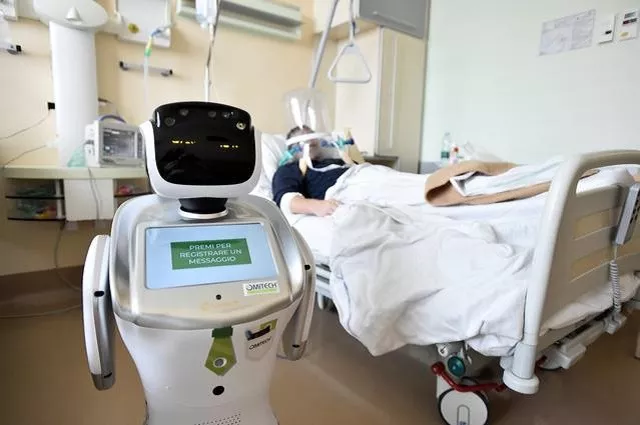Tommy the robot nurse helps keep Italy doctors safe from coronavirus
Tommy is one of six new robots helping flesh-and-blood doctors and nurses care for coronavirus patients
ITALY: He doesn’t wear a mask but he is helping save lives from coronavirus just the same. Meet Tommy, the robot nurse.Tommy is one of six new robots helping flesh-and-blood doctors and nurses care for coronavirus patients at the Circolo Hospital in Varese, a city in the northern Lombardy region that is the epicenter of the outbreak in Italy.
“It’s like having another nurse without problems related to infection,” said Doctor Francesco Dentali, director of intensive care at the hospital.
The child-size robots with large blinking eyes are wheeled into rooms and left by a patient’s bedside so doctors can look after others who are in more serious conditions.
They monitor parameters from equipment in the room, relaying them to hospital staff. The robots have touch-screen faces that allow patients to record messages and send them to doctors.
Apple works with White House to release ‘COVID-19’ app, website
Most importantly, Tommy and his high-tech teammates allow the hospital to limit the amount of direct contact doctors and nurses have with patients, thus reducing the risk of infection.
More than 4,000 Italian health workers have contracted the virus treating victims in Italy and 66 doctors have died.
The death toll in Italy, the world’s hardest-hit country in terms of deaths, topped 13,000 on Wednesday, more than a third of all global fatalities.
“Using my abilities, medical staff can be in touch with the patients without direct contact,” Tommy the robot, who was named after a son of one of the doctors, explained to a visiting reporter on Wednesday.
It takes a while for patients to realise that, given the enormity of the task of combating coronavirus and the toll it is taking on overworked medical staff, robots may be just what the doctor ordered.
Nextdoor brings neighbours together in the time of social distancing
“You have to explain to the patient the aim and function of the robot,” Dentali said.
“The first reaction is not positive, especially for old patients. But if you explain your aim, the patient is happy because he or she can speak with the doctor,” he said.
The robots also help the hospital limit the number of protective masks and gowns staff have to use.
“These days, they are a scarce resource,” said Doctor Gianni Bonelli, the hospital’s director.
The shortage of masks has been one of the biggest problems dogging the national health system since the contagion surfaced at the end of February.
The national commissioner for the emergency has said it will take Italy at least two months to become self-sufficient in producing protective masks.
Tommy and his fellow robot nurses have one more advantage - they are not subject to exhaustion. A quick charge of batteries and they are back at work in the ward.


COMMENTS
Comments are moderated and generally will be posted if they are on-topic and not abusive.
For more information, please see our Comments FAQ